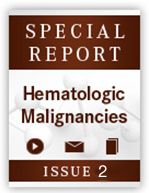New Data Suggests Role for CAR Treatment Post-Transplant in Advanced B-cell Cancers
Gene therapy has potential to deliver lasting remissions in patients with advanced B-cell malignancies who have undergone allogeneic hematopoietic stem cell transplant, according to research presented by James N. Kochenderfer, MD.
CAR Treatment Post-Transplant in Advanced B-cell Cancers

James N. Kochenderfer, MD
Gene therapy has potential to deliver lasting remissions in patients with advanced B-cell malignancies who have undergone allogeneic hematopoietic stem cell transplant, according to research presented by James N. Kochenderfer, MD, at the 2015 ASH Annual Meeting.1
In a small phase I study, researchers at the National Cancer Institute engineered T cells of original transplant donors to express a chimeric antigen receptor (CAR) that targets CD19, a protein on the surface of most B cells, and then infused the CAR therapy into the patients.
Patients received a single infusion of the CAR T cells without any chemotherapy. Of the 20 patients treated during the study, 7 achieved a complete remission (CR), including 4 people with minimal residual diseasenegative CRs. Three patients have CRs that are still ongoing at 18 months, 31 months, and 36 months, respectively. Additionally, 2 patients experienced a partial response, including 1 ongoing after 18 months, and 7 reached stable disease (SD) status.
The results are noteworthy because of the advanced malignancies of the patients who participated in the study, said lead investigator, Kochenderfer, MD, NCI Experimental Transplantation and Immunology Branch, during a press briefing during which he detailed his findings.
“Keep in mind that these patients had failed all standard therapies and went on to allogeneic transplant, which is considered a last-chance therapy for these patients, and continued with progressive malignancy after that. It’s a very, very high-risk patient population," said Kochenderfer, who added that this treatment offers hope of a promising new option for those who have exhausted all available treatment choices.
The study results “point toward a future in which antigen-specific T-cell therapies will be an important part of the field of allogeneic hematopoietic stem cell transplantation,” Kochenderfer and colleagues said in their conference abstract.
Five Tumor Types in Study
The study participants included 5 patients each with these tumor types: acute lymphoblastic leukemia (ALL), chronic lymphocytic leukemia (CLL), mantle cell lymphoma (MCL), and diffuse large B-cell lymphoma (DLBCL).
The allogeneic anti-CD19 CAR therapy appears to be most effective against ALL and CLL, said Kochenderfer. Four of the 5 patients with ALL initially achieved CRs; among the 5 patients with CLL, responses included 1 CR, 1 PR, and 1 SD.
Patients with B-cell malignancies that persist after an allogeneic stem cell transplant are often treated with unmanipulated donor lymphocyte infusions, but these treatments have inconsistent efficacy and are associated with significant morbidity and mortality from graft-versus-host disease (GVHD), said Kochenderfer.
“We’re trying to genetically enhance the donor’s own lymphocytes to make the infusion of lymphocytes more effective,” he said.
Investigators returned to the original donors, who included siblings and matched donors, for another donation. Each patient’s CAR therapy took 8 days to manufacture.
Kochenderfer said none of the patients treated during his study developed new onset of acute GVHD. One patient who had chronic GVHD before receiving the CAR therapy experienced a worsening of the condition, while another patient “developed very mild chronic eye GVHD” more than a year after treatment.
“Patients with high tumor burdens did have severe cytokine-release syndrome with fever, tachycardia, and hypotension,” said Kochenderfer. He said these patients were treated with tocilizumab.
Neurological toxicity was rare, with only 1 case of mild aphasia, he noted.
Several CAR doses were tested during the study, with 107 total cells/kg as the highest dose administered. Since chemotherapy was not given along with the CAR treatment, patients can receive a higher CAR dose without unacceptable toxicity, Kochenderfer said.
He said 1 patient with DLBCL who received the highest dose achieved a dramatic responsethe tumor mass disappeared within two weeks. That patient is the same participant who started the trial with GVHD and, although that condition has worsened, she remains in complete remission from DLBCL after about 13 months.
Future Development of Gene Therapy
Kochenderfer said the next step in his research concerning the use of CAR therapy after allogeneic transplant is exploring different T-cell culturing methods in an effort to produce a less differentiated T cell that would make the agent more effective.
He said that he and Steven A. Rosenberg, MD, PhD, head of the NCI’s Tumor Immunology Section, developed the CD-19targeting agent studied in the posttransplant trial in 2007-2009.
It is the same agent that Kite Pharma, a biopharmaceutical company based in Santa Monica, California, is developing, said Kochenderfer. However, he said the posttransplant study was an academic trial that Kite did not sponsor.
Earlier this month, Kite announced the launch of a phase I/II trial of KTE-C19 for the treatment of adult patients with ALL that has relapsed or become refractory following standard chemotherapy or hematopoietic stem cell transplant.2
ZUMA-3 is a single-arm, open-label, multicenter study that seeks to enroll 75 patients; safety measures and the overall CR rate are the primary endpoints.
The study is 1 of 3 early-phase trials evaluating KTE-C19 which Kite currently is sponsoring. ZUMA-1 is evaluating the therapy in patients with refractory, aggressive non-Hodgkin lymphomas including refractory DLBCL, primary mediastinal B-cell lymphoma, and transformed follicular lymphoma. ZUMA-2 will test the therapy in patients with relapsed/refractory MCL.
References
- Brudno JN, Somerville R, Shi V, et al. Allogeneic T-cells expressing an anti-CD19 chimeric antigen receptor cause remissions of B-cell malignancies after allogeneic hematopoietic stem cell transplantation without causing graft-versus-host disease. Presented at: 2015 ASH Annual Meeting; December 5-8, 2015; Orlando, FL. Abstract 99.
- NIH Clinical Trials Registry. www.ClinicalTrials.gov. Identifier: NCT02614066.

Survivorship Care Promotes Evidence-Based Approaches for Quality of Life and Beyond
March 21st 2025Frank J. Penedo, PhD, explains the challenges of survivorship care for patients with cancer and how he implements programs to support patients’ emotional, physical, and practical needs.
Read More